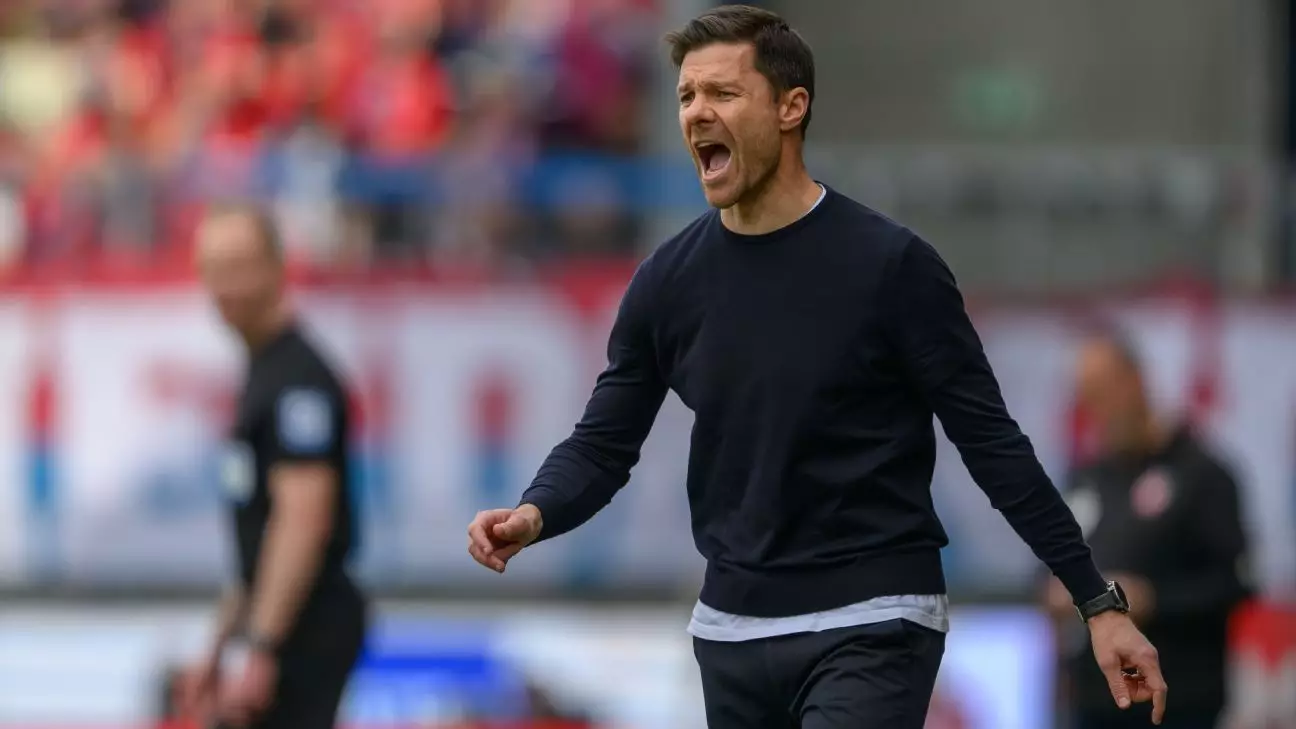In the ever-evolving landscape of professional football, few topics elicit as much speculation as the future of a high-profile coach. One of the most intriguing narratives currently unfolding centers around Bayer Leverkusen’s head coach, Xabi Alonso. The former Spanish international, renowned for his vision and tactical acumen, has led Leverkusen to impressive heights since taking over in October 2022. Yet, as whispers of his potential departure circulate, particularly regarding a prestigious position at Real Madrid, one must assess the broader implications of such a transition.
A Gentleman’s Agreement: Trust and Espionage
Fernando Carro, Bayer Leverkusen’s CEO, recently disclosed a “gentleman’s agreement” with Alonso, suggesting an understanding that if an opportunity arises from a club where Alonso previously donned the jersey, a conversation can take place. This agreement speaks volumes about the mutual respect and trust that has developed between the coach and the club. It balances the ambitions of a rising star against the club’s desire for stability, revealing an intricate web of loyalty and opportunity that is standard in football management.
Carro’s public statements portray a sense of preparation on the part of Leverkusen. The club acknowledges Alonso’s potential as a future top-tier manager, possibly with global powerhouses like Real Madrid or Liverpool. This narrative of readiness reflects the pragmatic mindset required in football; clubs must always be a step ahead, anticipating the unexpected. Yet it also raises questions about the integrity of such agreements. Are they indeed rooted in trust, or do they expose the club to potential manipulation from outside forces seeking to lure away a valuable asset?
What Makes Alonso Valuable?
Alonso’s meteoric rise as a coach is no accident. After transforming Leverkusen from Bundesliga strugglers into champions, he demonstrated not only tactical proficiency but also an ability to inspire and improve players. Under his stewardship, the club has achieved significant milestones, including a memorable DFB-Pokal win. His playing pedigree, marked by success in multiple top leagues and international tournaments, provides him with a unique insight into player psychology and game management, setting him apart from his contemporaries.
The stakes, however, remain high. Even with an impressive track record, the pressures of managing a club with ambitions to reclaim its stature in European football will be immense. The vulnerabilities of his current situation—sitting eight points off the top of the Bundesliga and exiting the Champions League—place additional pressure on his future decisions.
The Liverpool Connection: A Complicated Web
Speculation was rife following Jürgen Klopp’s unexpected resignation from Liverpool, creating an immediate link between Alonso and the Merseyside club. Although many fans envisaged a romantic return for the midfielder-turned-manager, he opted to remain at Leverkusen, emphasizing loyalty and commitment to the project he started. In an age where loyalty is often overshadowed by financial incentives, Alonso’s decision to stay speaks to character traits that are all too rare in modern football.
However, this does not mean that the allure of clubs like Liverpool or Real Madrid has dissipated. As these giants continue to evolve, the temptation for Alonso to take the reins of a storied club looms large. Yet one has to wonder about the long-term sustainability of such ambitions. Should he leave too early, would he risk condemning himself to the cycle of manager turnover—a trap that has claimed many promising careers?
Leverkusen’s Position: Navigating a Crossroads
While optimism surrounds Leverkusen’s capacity to hold onto Alonso, the club is acutely aware of the shifting sands of football management. Carro’s acknowledgment of the potential for a coaching change illustrates a willingness to navigate these treacherous waters intelligently. The possibility of lucrative offers from more illustrious clubs poses a constant threat, but it is vital for Leverkusen to maintain its trajectory, regardless of Alonso’s decision.
Furthermore, Carro’s hopes for a prolonged partnership underline the importance of stability as they build the team’s future. Successful clubs invariably revolve around a coherent strategy that encompasses coaching, player recruitment, and development. Given Alonso’s proficiency in cultivating talent and implementing systems, it would be prudent for Leverkusen to prioritize extending his contract beyond 2026.
The delicate balance between ambition and loyalty, framed within the context of imminent decisions, makes this an exhilarating time for both Alonso and Bayer Leverkusen. As future developments unfold, the football world will undoubtedly watch this story with bated breath.

Leave a Reply